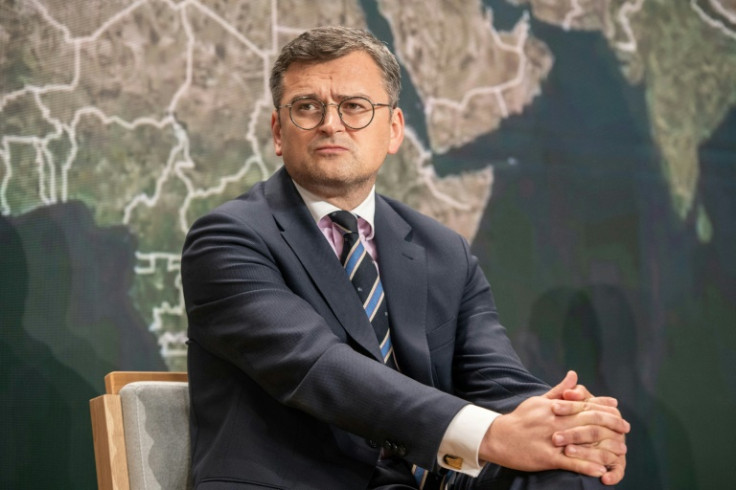Ukraine Steps Up Pressure On Its Allies For Action Against Russia

Ukraine stepped up the pressure on its Western allies Saturday, deploring the lack of progress on setting up an international tribunal to try Russia's leaders and on the transfer of frozen Russian assets.
"Unfortunately, we are in a kind of deadlock on both because we have divisions on the first issue and there is clearly a lack of will on the second issue," Foreign Minister Dmytro Kuleba said, referring to a tribunal.
Taken together, the speeches by several senior administration officials drew a picture of a country at war held back by allies who had failed to grasp the scale and urgency of the crisis.
Kuleba said the G7 group favoured a hybrid tribunal based on Ukrainian legislation.
But this, he said, would not allow for the immunity of Russian President Vladimir Putin, Prime Minister Mikhail Mishustin or Foreign Minister Sergei Lavrov to be stripped -- an unacceptable option for Kyiv.
Ukrainian officials are arguing for an international court resembling the post-WWII Nuremberg tribunal.
There has been insufficient progress too, on the transfer of frozen Russian assets to Ukraine for use in the country's reconstruction, Kuleba added.
After a year and a half, I'm still hearing from Europe and America: we are working on it," Kuleba said.
"There is a lack of will to come to a conclusion. So we have to change that."
Since Moscow's invasion in February 2022, Western sanctions have led to the freezing of some 300 billion euros of Central Bank of Russia foreign exchange reserves around the world.
Kuleba was addressing a conference in Kyiv Friday, but his comments were only released on Saturday.
These latest comments came a day after Ukrainian President Volodymyr Zelensky said the slow delivery of western weapons was hampering the counteroffensive against Russian positions in the east and south of the country.
Newly appointed Defence Minister Rustem Umerov returned to that theme in another speech released on Saturday.
"We are grateful for all the support provided... We need more heavy weapons," Umerov said in his embargoed speech.
But he added: "We need them today. We need them now."
Zelensky, in his comments on Friday, suggested that Moscow was counting on a Republican victory in next year's US presidential election to see a reduction in Washington's support for Ukraine.
He called for more powerful weapons to be delivered more quickly -- and for the more urgent application of sanctions, adding: "The longer it takes, the more people suffer."
Deputy Intelligence Chief Vadym Skibitsky estimated Saturday that Russia has more than 420,000 soldiers in the east and south of Ukraine, including Crimea.
Skibitsky also said Russia had for a month been actively launching attacks from Crimea, which it annexed in 2014.
"Drones deployed in Crimea are used against our ports of Izmail and Reni" used as alternative exports hub, particularly since the expiry of the deal allowing grain exports on the Black Sea.
Ukraine launched a counteroffensive in the east and south of the country in June but has come up against fierce resistance from entrenched Russian forces.
Kyiv's troops are also having to fight off renewed assaults around Kharkiv in the northeast, in areas liberated last year.
"(Russians) want to take their revenge" in the Kharkiv region, said Deputy Defence Minister Ganna Malyar.
Russian troops were trying to disperse Ukrainian forces in the east "so that we can't centralise them around Bakhmut, where we are successfully advancing", she added.
"The enemy is strong," she acknowledged. "They have more people and weaponry."
Intelligence chief Kyrylo Budanov said Ukrainian strikes on Russian territory were mainly aimed at military targets.
"All (the targets) are enterprises of the military-industrial complex," said Budanov. "This is the difference that distinguishes us from Russians."
"Enterprises burn, high-tech machines burn, there are explosions, there are very deep sabotage measures, but people do not suffer."
Attacks on Russian territory, which were rare at the beginning of the offensive, have intensified in recent months, with Kyiv increasingly claiming responsibility for them.
Russian authorities have reported civilian casualties from some Ukrainian attacks.
Budanov also said that a site manufacturing chips used in Iskander missiles had recently been attacked.
"Explosions in the aggressor country sober up society a little, but they don't have a massive effect yet," he said, adding: "It's a matter of time."
During a two-day visit to Ukraine earlier in the week, US Secretary of State Antony Blinken paid tribute to the "extraordinary resilience" of the Ukrainian people, while also announcing $1 billion of new wartime aid.

© Copyright AFP 2024. All rights reserved.





















